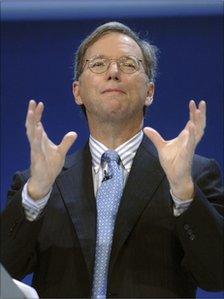Google outlines plan to keep smartphone market lead
- Published
Google’s Hugo Barra tells Rory Cellan-Jones that its operating system is ready for a new generation of tablets
After years of warnings from science fiction writers, it seems androids may finally be taking over the world.
For now, their influence is limited to mobile phones, in the guise of Google's hugely popular operating system.
At Mobile World Congress in Barcelona, hundreds of Android-powered devices were on show.
Google's chief executive Eric Schmidt declared his company's platform to be the market leader.
"It is the fastest growing mobile ecosystem," he told delegates.
Mr Schmidt said that 300,000 Android-based phones are being activated each day, and more than 170 Android compatible devices are on the market.
Centre of attention
He claimed that IT graduates, fresh out of university were attracted to working on the platform.
"Young programmers think mobile first. That is where the action is," he said.
Around the halls of the world's largest mobile phone show, Android seemed omni-present.
HTC's stand was full of Android devices, while LG's headline grabbing 3D smartphone and tablet also feature Google's operating system.
Android's own colourful stand was a mini version of Google's famous Mountain View headquarters, with its huge Android slide and smoothie bar.
But despite the fun image, Android has not been without its critics.
Fragmented market
One of the biggest problems faced by Android is fragmentation, according to Ben Trewhella from application developer Mubaloo.
"The growth in Android has come from a large number of mobile manufacturers finding it easy to adapt to various screen sizes, hardware features and unique user interfaces.
"Developers are having to test across many devices and sometimes create device specific versions," he said.
During a question and answer session that followed Mr Schmidt's keynote, he was asked about the issue of fragmentation.
"You develop an app on one device and it won't run on another," the questioner said.
"We hear some of this," Mr Schmidt replied.
"Under our terms and agreements there is an anti-fragmentation clause. No operator will want to be in an eco-system without access to all apps but we do this by conformity to the apps [policy] rather than forcing anyone on a platform," he said.
As more devices move onto Google's latest iteration of Android - Gingerbread - fragmentation will be less of an issue, he said.
"Everyone on a common platform should address your concerns."
Sweet dreams
Mr Schmidt also gave a glimpse of Android's future.
"We've had Gingerbread, which begins with a G, then Honeycomb [the first version designed with tablets in mind], which begins with an H so the next one will begin with an I and be named after a dessert," he said.
But while Google is busy working through the mobile alphabet, software maker Microsoft is hoping to attract some attention away from the little green robot.
Before the first queues had even formed in Barcelona, the software giant stole a march on its rivals with the announcement that it had signed a deal with Nokia to make the software giant's Windows Phone 7 its primary operating system for smartphones.
Mr Schmidt said Google had "tried" to woo Nokia.
"We would have loved if it they had chosen Android. The offer remains open," he said.
Joint forces

Google's smartphone and tablet systems will be compatible say chief executive Eric Schmidt
Android's director of mobile experience Matias Duarte was magnanimous in defeat.
"Microsoft has done a nice job with Windows 7. It is a beautiful design, but at Android our ambitions are about as big as they get. We want to create the best mobile platform," he said.
During his keynote speech, Microsoft's chief executive Steve Ballmer was in more modest mood.
"We are off to a strong start but we know we have a lot of work to do," he said.
The Microsoft/Nokia partnership has a long way to go to catch Apple and Android, according to Ian Fogg, an analyst with Forrester Research
"It certainly strengthens the Windows Phone 7 brand in the market but the fundamental issue will be what will Microsoft allow Nokia to do that will differentiate the first Windows Nokia phone?" he said.
Android is hardly a veteran itself, having only came onto the market in 2008.
At the time, operators were crying out for a viable alternative to the dominance of Apple.
"There are multiple reasons why it is popular but simply put, it brought an iPhone like experience to other devices," said Tony Cripps, an analyst with research firm Ovum.
Elephant in the room
According to figures from Canalys, in 2010 Android went from being a bit player in the smartphone market to outselling Nokia's Symbian operating system.
In the last quarter of 2010, 32.9 million Android-based phones shipped worldwide, compared with 31 million running on Symbian. Apple had 16.2 million and RIM 14.6 million.
"There are always shifting sands when it comes to operating systems. Three years ago, Symbian was the number one," said Mr Cripps.
The death knell for Symbian may have been sounded, but it could be too early to declare the mobile operating systems battle a three horse race, as Nokia's Stephen Elop did last week.
Blackberry is still very much in the race, said RIM co-executive director Jim Balsillie.
"We feel very good about our business. I wouldn't write us off."
He said that the firm had experienced 70% growth in the last year and is appealing to a new demographic of teenagers, who love Blackberry Messenger.
But the elephant in the room at Mobile World Congress was Apple. It had no stand at the event and no keynote speakers, yet the iPhone was still in the hands of many of the delegates.